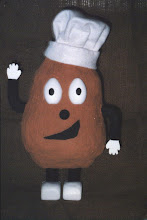I have just recently discovered the wonderful world of Star Trek Voyager. I have always been a fan of the original Star Trek television series (TOS as it is known to many amateur and avid Trekkies). I also was a religious watcher of Star Trek: The Next Generation. Again, this series being known by its initials, TNG.
As far as I know, there is no abbreviation for Voyager. I'm not sure there would be an appropriate shortening of a one-word title, unless you would employ the tactic used in the first Star Trek movie: V-ger (phonetically: Vee-jer).
Anyway, on my journey through this strange new world of Captain Janeway and her crew, I found an anomaly that I thought at the time to be unique to the series.
As advanced as this culture seems to be in the fields of medicine and science, they seem to be baffled by the simplest things and the English language used to describe them.
Case of point: More than a few times throughout an episode, I find myself hearing an officer describing a discovery as "Some type of [discovery]" or "Some kind of [discovery]." These discoveries usually involve a strange life form or anomaly happened upon in the course of their journey.
My wonderment lies in why it is necessary to add the predicate of "some kind of..." to these observations. First of all, in I would imagine many communication systems across the galaxy and beyond, "some kind of" usually implies that there are more than one kind of the subject in question. Therefore, if the subject in question is a new life form or space occurrence, how is the aforementioned officer to submit that there exists more than one kind of it?
By the same token, to say, "some type of anomaly," would be, by definition, redundant ("some type of" and "anomaly" both referring to the idea of the unknown). Also, from a literary perspective, is it really all that necessary to add this phrase to the comment? And beyond that, if you watch the show enough, you will come to realize that this pattern of speech is put to use in excess of what might be considered normal throughout common conversation.
WHEW! If THAT wasn't a mouthful!
But wait...there's more...not much, but more, nonetheless (a phrase which perhaps warrants a blog entry of its own).
I don't wish ill upon this already-fated-by-cancellation series. It still deserves its merits where they are due. But I am afraid this trend has spread throughout much of Television and movie land, and even into our common vernacular.
With the risk of becoming paranoid with every word you utter (or perpetuating the situation if it already exists), I urge you to stop an consider your speech and text and other forms of communication before you too fall victim to redundancy or extraneous nouns, verbs, adjectives and the like.
What type of person would that make you?
Perhaps some kind of grammar geek like me!
Subscribe to:
Post Comments (Atom)

No comments:
Post a Comment